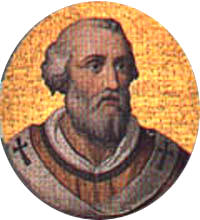 John XII might be called a poor little rich boy. His father
Prince Alberic had secured the election of good, if not overaggressive, popes.
He had even favored monastic reform. But he left a miserable legacy to the
Church--his son. Alberic had made the clergy promise to elect his son Octavian
as successor to Agapetus II. Brought up free and easy with plenty of money,
Octavian was a young man more fitted to adorn the ranks of cafe society than the
Chair of Peter.
John XII might be called a poor little rich boy. His father
Prince Alberic had secured the election of good, if not overaggressive, popes.
He had even favored monastic reform. But he left a miserable legacy to the
Church--his son. Alberic had made the clergy promise to elect his son Octavian
as successor to Agapetus II. Brought up free and easy with plenty of money,
Octavian was a young man more fitted to adorn the ranks of cafe society than the
Chair of Peter.
On his father's death he had succeeded to his titles and power.
On the death of Agapetus, he became pope. The first pope since John II to change
his name, he took the name John XII. John XII has a bad reputation, but it is
only fair to remember that many of the stories told about him come from
political enemies, especially that evil-tongued old gossip, Liutprand of Cremona.
But even after allowing a generous discount for prejudice, enough remains
against John XII to rank him as one of the few bad popes. Though John enjoyed
temporal power as well as spiritual, he was not long to enjoy this double power.
Berenger, king of Italy, had made himself so unpopular that Pope John voiced the
sentiments of the Italian people when he called on King Otto I of Germany to
free Italy from Berenger's tyranny. Otto chased Berenger into the mountains,
then entered Rome to be welcomed by the Pope. Otto guaranteed the privileges and
territory of the Pope and John agreed to support Otto. Once more the Roman
Empire came alive as on Candlemas Day, 962, the Pope crowned Otto emperor. But
after Otto went north to complete the liquidation of Berenger, John, realizing
that Otto meant to supervise matters in Rome, plotted against him with Berenger
and his son Adalbert. At first Otto laughed it off, but the imperialist faction
at Rome, not amused, urged the Emperor to come back. When he approached the city
in November 963, Pope John fled. Otto made the Romans swear henceforth never to
elect a pope without his approval. A synod summoned John to come back and stand
trial for his misdeeds. John answered by threatening to excommunicate anyone who
should attempt to set up an antipope. The council did just that. After a month
it declared John deposed and elected Leo, a layman.
But Leo's power lasted only until Otto left the city. Then back
came John in triumph. He made good his threat of excommunication and made life
miserable for the imperialists. Otto, on hearing of all this, was preparing to
return when he learned that on May 14, 964, John XII had died. John, if
Liutprand can be believed, died an evil death; struck down while in the act of
adultery, he lingered eight days and died without Holy Viaticum.
Excerpted from "Popes
Through the Ages" by Joseph Brusher, S.J.

